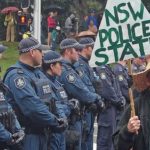Judges Call For Oversight of Police Powers During COVID-19

A number of prominent former Australian judges are calling for a bi-partisan parliamentary oversight committee to ensure adequate scrutiny of Australia’s COVID-19 response.
A similar body has already been established in New Zealand, with many local legal scholars sounding the alarm about overreach in a time of crisis.
Who is calling for this?
The move is being called for by former judge of the NSW Court of Appeal and ex-president of the Anti-Discrimination Board Paul Stein as well as members of the National Integrity Committee, including former judges Mary Gaudron, David Harper, Stephen Charles, Anthony Whealy, and Margaret White.
The distinguished members are calling for a body similar to the New Zealand Epidemic Response Committee, which is a multi-party special select committee designed to provide oversight of the country’s response to the pandemic.
If formed, committee would play a vital function of accountability whilst Federal parliament is shut down because of public health concerns.
“To ensure accountability and to preserve our democratic principles, it is important that when it returns, our parliament establishes a special parliamentary oversight committee along the lines already adopted in New Zealand,” said Ms Gaudron, who was the first women appointed to the Australian High Court.
The group is asking parliament to consider the proposal when it next re-convenes.
What are the concerns?
Australia’s response to COVID-19 has already raised a number of red flags for legal and civil liberties group.
These include the harsh criminal penalties for non-compliance with public health orders and directions, as well as incredibly broad powers for enforcement.
In NSW, strict directions require a person to not leave their home without a reasonable excuse, carry a risk of 6 months in prison and/or a fine of $11,000.
The Australian Lawyers Alliance has also noted the impact of public health orders on vulnerable members of the community.
“We are aware of many people in our community who are finding it very difficult to follow the new COVID-19 public health orders because they simply don’t have anywhere to live, or because they have a drug dependency and are fearful of prosecution or being forced into a medically-unsupported withdrawal whilst in quarantine” noted Tasmanian ALA President, Fabiano Cangelosi.
Accountability is key
Parliamentary scrutiny is an important feature of our political system to ensure laws do not encroach on fundamental rights and freedoms.
A number of committees already exist to scrutinise government actions including a Parliamentary Joint Committee on Human Rights, however extraordinary times often call for extraordinary solutions.
It’s envisioned that a COVID-19 oversight committee would review all levels of government’s response to the pandemic, with hearings publicly broadcast.
In the words of former judge Paul Stein:
“The establishment of such a committee represents a clever and principled compromise between the government, which has rightly closed parliament for public health reasons, and opposition parties which equally rightly want parliament sitting to hold the government accountable for its actions in a time of such crisis”.






